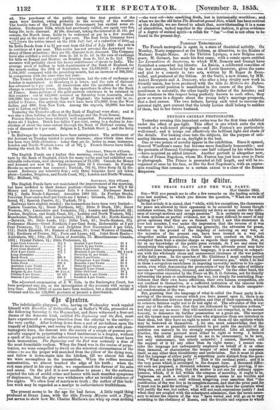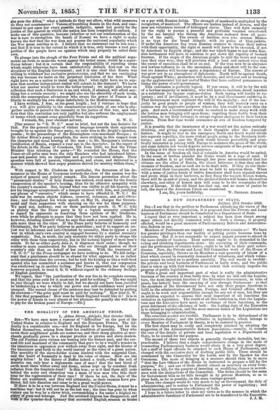Paul to tbt attar.
THE PEACE PARTY AND THE WAR PARTY.
31st October 1855.
Six-Will you permit roe to offer a few remarks on the leading article of your last number, in which you discuss the question, " What are we AO fighting for ?"
In that article it is stated, that "while, with few exceptions, the clamourers for peace are allowed by their opponents to be actuated by honest though - mistaken notions, the latter are generally set down as men under the influ- ence of corrupt motives and savage passions." It is certainly an easy thing to form opinions on partial evidence, nor is it more difficult to assert of any given opinions that they are so formed. Until I saw this statement in your last number, I was under the impression that the reverse of it was far nearer the truth ; that, speaking generally, the advocates for peace, whether on the ground of the impoliey of entering on any war, or the injustice of the present one, have been treated in a way not altogether unlike persecution, while their own conduct on the whole exempted them from a similar charge as regards their opponents. Nor, so far as my knowledge of the public press extends, do I see any cause for abandoning this opinion ; for, even if some who advocate peace may have exhibited some intemperance in their language, it is as nothing in compari- son with the wholesale abuse and unmeasured virulence of the war portion of the daily press. In the speeches of Mr. Gladstone I must confess myself wholly unable to discern any "explosions of corrosive gas," while I do find in them a scrupulous carefulness in imputing unworthy motives to his oppo- nents, even while denouncing the prosecution of war for the sake of military success as "anti-Christian, immoral, and inhuman." On the other hand, the low vituperation expended by the Times on Mr. S. G. Osborne, not for directly advocating the peace or condemning the war, but simply for reminding Eng- lishmen that their own home affections, their own human sympathies, are not confined to themselves, is a sufficient indication of the rancour with which they are regarded who go far beyond Mr. Osborne in their unequivo- cal condemnation of the war.
But, granting that the language of what is called the Peace party is de- serving of the strong censure which you have passed upon it, there is an essential difference between their position and that of their opponents, which in common fairness ought not to be lost sight of. The advocates of this war may say of the other side, that they are influenced by "mistaken notions," but they can say no more : they who condenin it are compelled, in the merest honesty, to denounce its further prosecution as a great sin. The usurper and the tyrant may consider that those who stigmatize them are mistaken in their ideas, but they have no right to retort on them.all the epithets which may be bestowed on themselves. I, for one, must acknowledge that the disposition now so generally manifested to put aside the morality of the question can scarcely be too strongly reprehended. Like all matters of practice, the course pursued must either be right or wrong. I believe the war, which all along seemed to me to be unnecessary, to be now, not only unnecessary, but utterly unlawful : I cannot, therefore, call the support of it by any other than its right name; I cannot con- sider the language not unfrequently employed on behalf of it as other than immoral, or characterize the temper of mind which so expresses itself, as any other than bloodthirsty and unchristian. But it must be plain that the language of either party is something quite distinct from the ques- tion, " What are we fighting for ? " This is the cardinal point; and it is the very point which is enveloped in the deepest haze. A thousand differ- ent ends are proposed, a thousand schemes suggested,-all proving, if no- thing else, yet at least this, that the matter is not one for ordinary appre- hension, which, if it fall within the compass of morality, it ought to be. Vagueness on such a subject as the present seems to me terrible and ominous, and I cannot read without misgiving your assertion that "the justification of the war lies in its complete success, and that the price paid for it must not be paid for nothing." It is not so much here the question what will justify the war, but rather, what will not such expressions justify ? And when they are coupled with the subsequent admission, that the terms neces- sary to secure the objects of the war have varied and will go on to vary according to the obstinacy of Russia, and the trouble and expense to which she puts the Allies," what a latitude do they not allow, what wild measures do they not countenance ? Visions of humbling Russia in the dust, and reso- lutions to put upon her every possible indignity, speak but poorly for. the justice of the quarrel in which the nation has been compelled to embark. I make use of this question, because (whether or not our condemnation of the war is sure to strengthen the hands of Russia) we have a right 'to make known the fact that the war does not possess the universal popularity which the War tress ascribes to it. • I believe that no statement can be less true ; and that it is true to the extent in which it is true, only because a vast pro- portion of the people have no opinion which may properly be called their own. To plunge into the slough of the Four Points and all the political argu- ments sat forth to make the worse appear the better cause, would le a super- fluous' labour ; but it is certain that the responsibility of rejecting terms which might otherwise have been satisfactorily defined, does rest on the shoulders of the English Government; and it is also clear that Russia was willing to withdraw her exclusive protectorates, and that we are continuing the war because we insist on the perpetual limitation of her fleet. What right have we as a nation to insist upon this ? what right have we to sup- pose that another independent nation will submit to the demand ? We know what our answer would be were the tables turned; we might also learn on reflection that such alimitation is an end which, if attained, will afford any- thing but a certain security ; we might also see the absurdity of such terms, while the unscrupulous adventurer who sways the power of France is at liberty to multiply his own ships indefinitely in the Mediterranean. I hkve,written, I fear, at too great length ; but I venture to hope that you will give publicity to the conscientious conviction of one who is alto- gether unable to perceive the necessity or the justice of this war, and who feels that this conviction not only justifies but also enforces the employment of terms which cannot come gracefully from its supporters.
I remain, Sir, your obedient servant, G. W. C.
[Our answer to " G. W. C." must be brief, but not the less decisive for that. For the general charge of violent language towards their opponents brought by us against the Peace party, we refer him to Mr. Bright's speeches, passim ; to the proceedings of the Birmingham corn-merchant Sturges • to Sir Arthur Elton's penny pamphlets, the more striking in this respect from the character and usual bearing of the man ; to Mr. Macqueen's elaborate justification of Russia, exposed a year ago in the Spectator. In the report of the debate in the House of Commons, 8th June 1855, we find the Prime Minister thus rebuking the party—" He reminded the House, that the Peace-at-all-price men were the only Members who had introduced bitter- ness and passion into an important and gravely-conducted debate. Their speeches were full of passion, vituperation, and abuse, and delivered in a manner which showed that angry passions strived for mastery within them," &c.- With respect to Mr. Gladstone in particular, the fierceness of his de- meanour in the House of Commons towards the close of the session was the subject of general and painful remark, His famous peroration about the "paramount destiny" of holy Russia was noticed, even more for the frantic exasperation of the speaker's bearing, than for its offensive sympathy with his country's enemies. Butt beyond what was visible to all his hearers, was not his language symptomatic of a temper unusual with him, and justifying our phrase of " corrosive," which seems to have offended G. W. C. ? He calls war for certain objects hideous, immoral, inhuman, and anti-Chris- tian; and throughout his whole speech on May 24, charges the Govern- ment and their supporters with carrying on the war for these purposes. We need not, however, rest on these particular proofs. G. W. C. tells us plainly that the Peace party is by a logical necessity compelled to regard its opponents as deserving these epithets of Mr. Gladstone, even while he attempts to argue that they have not been applied. He is, however, deluding himself when he says that such a necessity exists on one aide more than on the other. If the Peace party believes in humanity and Christianity, the War party believes in patriotism ; and if to support an un- just war be inhuman and anti-Christian by necessity, then to oppose a just war in which one's own country is engaged becomes by a similar necessity unpatriotic. But, in truth, the only necessity for either party to charge the other with these vices respectively, lies in the natural bigotry of most men's minds. So far as either party does it, it disgraces their cause; though we confess to more consideration for those who err through passion on their country's side than on behalf of her enemies. With the treatment of "S. G. 0." by the Times newspaper we have nothing to do. We felt indig- nant that a gentleman should be so abused for what appeared to us rather noble sentiments than the reverse ; but he took his kicking so like a well-bred spaniel, who has committed a nuisance and knows it, that our compassion was swallowed up in another feeling. The Times apparently has the right, however acquired, to treat S. G. 0. without regard to the ordinary feelings of English gentlenien.
We repeat, that "the justification of the war lies in its complete success, and that the price paid for it must not be paid for nothing." The war might be just though we were wholly to fail, but we should not have been justified in undertaking a war to which our power and self-confidence were proved unequal. The second clause of the sentence may beat be defended by putting its converse—" the price paid must be paid for nothing." How does G. W. C. like that proposition? How does he think England would like it ? It is in the power of Russia to vary almost at her pleasure the penalty she will have to pay for the broken peace of Europe.—En.]



























 Previous page
Previous page